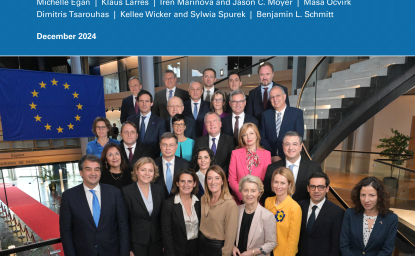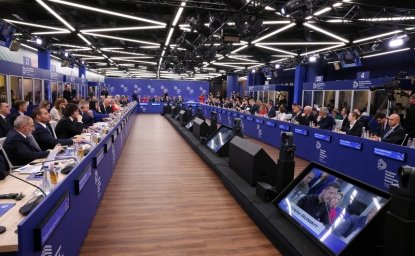275. East Central Europe between Paris and Washington

For some, Poland's emergence as a leading partner in the US-led campaign to rebuild Iraq came as a surprise. After all, so much effort has been spent on reforms, concessions and negotiations in preparation for EU accession, that it seemed to many that Poland, the Baltic States, Romania, Bulgaria and the Czech Republic were antagonizing precisely those countries they had been courting for years by supporting the US-led coalition. In response to the confusion, I would like to offer a historical-cultural explanation for those puzzled by this new world order.
The 1989 Revolutions and the Search for a New International Order
The end of the Cold War was the most palpable effect of the collapse of communism in Europe. Ever since, the Central and East European elite—reformers and reformed communists alike—yearned to ‘return to Europe.' This entailed reestablishing their independent membership in international structures.
While acceptance into the Council of Europe, the United Nations, and the European Union was important, NATO membership was correctly perceived by the Central and East European elite as the most crucial for several reasons. NATO offers CEE countries a political and military alliance that guarantees the independence of their new democracies. This is particularly important to countries that fear Russian aggression. NATO—rather than EU—membership has preempted the Finlandization of East Central Europe, allowing these countries to reaffirm their identities. Moreover, the continuation of an American presence in Europe helps to contain aggressive forms of ethnocentric populism and encourages democratic consolidation. As a distinguished Czech diplomat shared with me in 1998: absent a US presence in the region, the old demons of European nationalism would surely reemerge.
The Yugoslav Debacle
East European states realize the powerlessness of the West European military when faced with major crises. Their current pro-US orientation is a direct effect of the leading role taken by the United States in the military action in Kosovo. This has fostered a growing sense that the US has become not only a political and military hegemon, but also the main supporter of human rights against ideologically-inspired tyrannies. East Europeans have long distrusted West German pacifism (see Vaclav Havel's classic essay "Anatomy of Reticence") and have justified misgivings about the humanitarian commitment of states that were silent on Soviet militarism and imperialism. Many in East Central Europe recall General de Gaulle's categorization of the Soviet invasion of Czechoslovakia in 1968 as une querrelle de famille, which extinguished all hope for Western intervention. In some cases—Poland, the Czech Republic, and Hungary—memories of abandonment by West European powers have played an important role. Poles still remember West Germany's reticent attitude toward Solidarity and the lack of official support for the dissidents and human rights movements. Political elites in East Central Europe correctly identified the US as their main ally within NATO. Certainly, the EU is a strong magnet but, as the Romanian writer and former dissident Liviu Antonesei wrote in the Bucharest weekly Dilema (April 25 - May 1, 2003), France, Belgium and Germany are perceived as weak in opposing dictatorships, cynical and hypocritical. Memories of European indifference to tyranny combined with the disagreements over the Iraq policy between EU member states, meant that there was really no common European position that Eastern Europe could have endorsed during the Iraq war. As Andrei Plesu put it: "a question for Germany and France: Why did they support the bombing of Kosovo and oppose the same type of action in Iraq? Didn't Saddam engage in mass murder against his own people? And what is the moral base for a ‘principled' alliance with Russia (engaged in genocidal actions in Chechnya) and China?" (Dilema, April 11-17, 2003).
The New Anti-Americanism
The East European elite view French anti-Americanism— with its long traditions, documented in Tony Judt's Past Imperfect and Jean Francois Revel's recent book on anti-Americanism as a political obsession—as a political fantasy, a resentful political myth meant to symbolically compensate for France's loss of global influence. In Europe, the new anti-Americanism is linked to the old-fashioned anti-imperialism combined with sentiments of insecurity, frustration and angst generated by globalization. Pacifism is held as a high ideal, and thus any US military intervention is suspect. This trend was particularly striking in Greece, where certain elites (KKE-Greek Communist Party, former military junta figures and the hierarchy of the Orthodox Church) went so far as to support Slobodan Milosevic. For both younger generations and the elite in CEE (less so in Slovakia, Hungary and Czech Republic), pacifism is seen as a bogus ideology that ultimately serves the dictators of the world. Again Plesu's remarks are instructive: "in East Europe the Cold War was not called ‘Cold War' but ‘Struggle for Peace.'"
Whatever reservations over the impetus for the coalition's action against Saddam Hussein's regime, East Europeans see joining the coalition as an opportunity for solidarity in fighting a vicious, murderous and dangerous regime. Jacques Chirac's dismissive remarks did nothing but catalyze the anti-Paris sentiment in East Central Europe. The postcommunist elite sees France as arrogantly pursuing what David Ignatius called "A long running Gaullist challenge to American power and leadership" (Washington Post, May 23, 2003, "What Does France Want?"). France has formed a bloc with Russia and Germany, two countries that have posed grave threats to East Central Europe in the past. And East Europeans remember this history well: as one Hungarian dissident put it, "What do you expect Kwasniewski to do? To support Russia and Germany?"
Of course, anti-Americanism exists in East Central Europe as well. This ideology is espoused by strange coalitions, blending individuals and ideas from the left and the right—all the frustrated, discontented, resentful forces; losers of the transition; people who dislike parties and parliaments; neo-romantic poets; reactionary, chauvinist theologians (Radio Maria in Poland); opponents of markets; retired secret police officers and their former informants; conservative critics of mass democracy and enlightenment values. As Bulgarian political analyst Ivan Krastev put it: "anti-Americanism is an empty box in which old ideas can be put to new uses." This is the opportunistic anti-Americanism that can mix itself with religious nationalism and old-fashioned neo-Leninist (Stalinist) anti-Imperialism.
But the anti-American obsession—as an idée fixe—has not prevailed in East Central Europe. Whatever surveys say about approval or disapproval of the war in Iraq, pro-American sentiment is consistently high. East Central Europe does not participate in what Revel detects as the anti-American drive in West Europe rooted in resentment of America as the most successful experiment in democracy. This issue became particularly important after President Jimmy Carter's emphasis on America as the promoter of human rights. This new anti-Americanism—from Trotskyist anti-globalizers and naïve pacifists to Venezuela's President Hugo Chavez—dislike the US support for civic participation and free media. And it is not all about President George W. Bush. Even during the Clinton administration, anti-American demonstrations were held throughout Europe.
Tug-of-War for East Central Europe?
East Europe, as Jacques Rupnik put it, faces the challenge of double integration. East Europe has oriented politically and militarily towards Washington and has regarded the EU as a still problematic, uncertain economic community. These two goals complete and often compete with each other: EU integration and the simultaneous integration within the ‘empire of power' comprised of the US, Britain and their allies. When Havel supported the US-UK coalition, as Antonin Liehm recently wrote in Lettre Internationale, he remained loyal to his moral and political choice for a civilizational alliance. At this moment, irrespective of whose administration is in the White House, the global center is Washington, not Paris, Berlin or Moscow. NATO's future, therefore, is crucial for the reshaping of the world such that fascist-like regimes and religious-terrorist movements can be neutralized and finally annihilated.
Author


Global Europe Program
The Global Europe Program is focused on Europe’s capabilities, and how it engages on critical global issues. We investigate European approaches to critical global issues. We examine Europe’s relations with Russia and Eurasia, China and the Indo-Pacific, the Middle East and Africa. Our initiatives include “Ukraine in Europe”—an examination of what it will take to make Ukraine’s European future a reality. But we also examine the role of NATO, the European Union and the OSCE, Europe’s energy security, transatlantic trade disputes, and challenges to democracy. The Global Europe Program’s staff, scholars-in-residence, and Global Fellows participate in seminars, policy study groups, and international conferences to provide analytical recommendations to policy makers and the media. Read more

Explore More
Browse Insights & Analysis
Transatlantic Relations Under the New European Commission

Risky Game: Hybrid Attack on Baltic Undersea Cables

Why the European Political Community Still Matters
